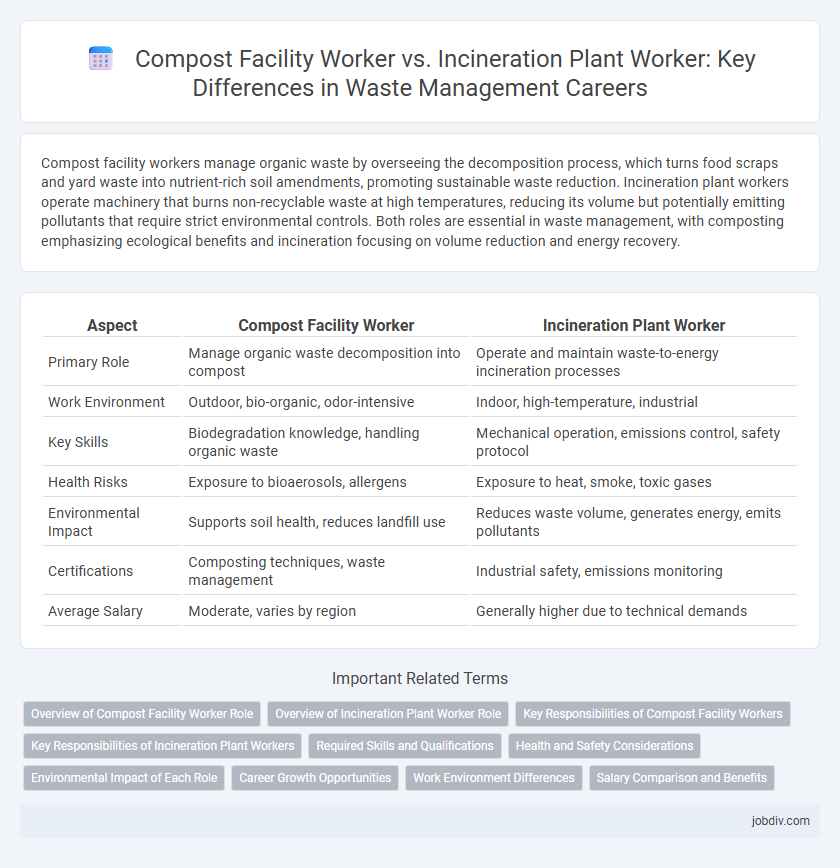Compost facility workers manage organic waste by overseeing the decomposition process, which turns food scraps and yard waste into nutrient-rich soil amendments, promoting sustainable waste reduction. Incineration plant workers operate machinery that burns non-recyclable waste at high temperatures, reducing its volume but potentially emitting pollutants that require strict environmental controls. Both roles are essential in waste management, with composting emphasizing ecological benefits and incineration focusing on volume reduction and energy recovery.
Table of Comparison
| Aspect | Compost Facility Worker | Incineration Plant Worker |
|---|---|---|
| Primary Role | Manage organic waste decomposition into compost | Operate and maintain waste-to-energy incineration processes |
| Work Environment | Outdoor, bio-organic, odor-intensive | Indoor, high-temperature, industrial |
| Key Skills | Biodegradation knowledge, handling organic waste | Mechanical operation, emissions control, safety protocol |
| Health Risks | Exposure to bioaerosols, allergens | Exposure to heat, smoke, toxic gases |
| Environmental Impact | Supports soil health, reduces landfill use | Reduces waste volume, generates energy, emits pollutants |
| Certifications | Composting techniques, waste management | Industrial safety, emissions monitoring |
| Average Salary | Moderate, varies by region | Generally higher due to technical demands |
Overview of Compost Facility Worker Role
Compost facility workers manage organic waste by operating machinery that processes food scraps and yard waste into nutrient-rich compost, supporting sustainable waste management practices. Their tasks include monitoring decomposition, removing contaminants, and maintaining equipment to ensure efficient and safe operations. These workers contribute to reducing landfill use and greenhouse gas emissions by transforming biodegradable materials into valuable soil amendments.
Overview of Incineration Plant Worker Role
Incineration plant workers operate high-temperature combustion systems that convert waste into ash, gas, and heat energy, requiring expertise in maintaining emissions controls and monitoring environmental safety. Their responsibilities include managing waste feed rates, ensuring compliance with air quality regulations, and performing routine equipment inspections to prevent malfunctions. Unlike compost facility workers who focus on organic decomposition, incineration plant workers emphasize technological operation and regulatory adherence to mitigate pollution and maximize energy recovery.
Key Responsibilities of Compost Facility Workers
Compost facility workers manage organic waste by sorting, shredding, and monitoring the decomposition process to produce nutrient-rich compost. They ensure proper aeration, moisture levels, and temperature to optimize microbial activity and prevent odor issues. Their role also involves maintaining equipment, conducting quality control tests, and complying with environmental regulations related to waste processing.
Key Responsibilities of Incineration Plant Workers
Incineration plant workers operate and maintain equipment that burns waste materials, ensuring efficient combustion and emission control to reduce environmental impact. They monitor temperatures, manage waste input, and conduct routine inspections to prevent malfunctions or hazardous releases. Their role is critical in transforming waste into energy while complying with regulatory standards for air quality and safety.
Required Skills and Qualifications
Compost facility workers require knowledge of organic waste processing, skills in operating composting machinery, and understanding of environmental regulations related to biodegradability and soil health. Incineration plant workers need expertise in managing high-temperature combustion systems, proficiency in monitoring air pollution controls, and qualifications in hazardous waste handling and safety protocols. Both roles demand adherence to safety standards, but compost workers focus more on biological processes while incineration workers specialize in mechanical and chemical waste treatment technologies.
Health and Safety Considerations
Compost facility workers face exposure to bioaerosols, fungi, and bacteria, necessitating respiratory protection and strict hygiene protocols to prevent respiratory illnesses and skin infections. Incineration plant workers encounter risks from toxic emissions such as dioxins, heavy metals, and particulate matter, requiring advanced ventilation systems, continuous air monitoring, and personal protective equipment to mitigate chemical exposure and reduce long-term health hazards. Both roles demand rigorous safety training and adherence to occupational health guidelines to minimize workplace accidents and chronic health conditions.
Environmental Impact of Each Role
Compost facility workers contribute to reducing methane emissions by transforming organic waste into nutrient-rich soil amendments, supporting soil health and carbon sequestration. Incineration plant workers manage waste combustion processes that decrease landfill volume but release greenhouse gases and potentially harmful pollutants into the atmosphere. The environmental impact of composting centers on sustainable waste recycling, while incineration has a mixed effect due to energy recovery balanced against air pollution concerns.
Career Growth Opportunities
Compost facility workers benefit from growing demand in organic waste management and sustainable agriculture, offering opportunities in facility supervision, environmental compliance, and soil science expertise. Incineration plant workers experience career growth through advancements in emission control technology, plant operation management, and regulatory roles focused on air quality and hazardous waste handling. Both careers provide pathways toward specialized environmental and engineering positions as waste management evolves.
Work Environment Differences
Compost facility workers typically operate in outdoor or semi-enclosed areas with exposure to organic materials, odors, and fluctuating weather conditions, requiring protective clothing against bioaerosols and physical strain from manual labor. In contrast, incineration plant workers work primarily indoors within highly controlled environments where temperatures are elevated, and stringent safety measures address exposure to emissions, heat, and high-voltage equipment. The physical demands and health risks differ significantly, with compost workers managing biological hazards and incineration workers facing chemical and thermal dangers.
Salary Comparison and Benefits
Compost facility workers typically earn a median salary of $32,000 to $40,000 annually, benefiting from health insurance and potential bonuses tied to environmental initiatives. Incineration plant workers generally receive higher wages, ranging from $40,000 to $55,000 per year, with added benefits such as hazard pay, retirement plans, and comprehensive safety training. Both roles offer job stability, but incineration plant workers often gain better financial incentives due to the operational risks involved.
Compost Facility Worker vs Incineration Plant Worker Infographic

 jobdiv.com
jobdiv.com